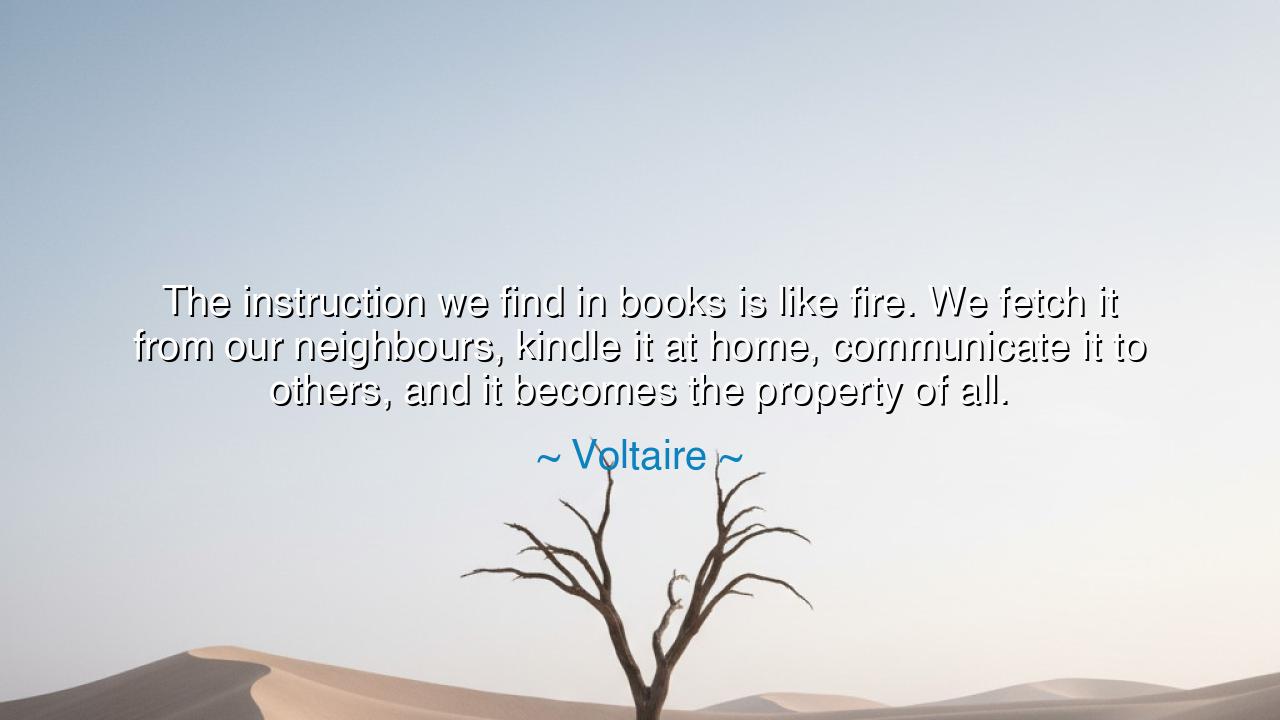
The instruction we find in books is like fire. We fetch it from
The instruction we find in books is like fire. We fetch it from our neighbours, kindle it at home, communicate it to others, and it becomes the property of all.






The philosopher Voltaire, that great torchbearer of the Enlightenment, once declared: “The instruction we find in books is like fire. We fetch it from our neighbours, kindle it at home, communicate it to others, and it becomes the property of all.” In these luminous words lies the eternal vision of knowledge as flame — a light born from one mind that, once shared, becomes the inheritance of humankind. Voltaire, who lived in an age when ignorance was power and books were often burned for daring to enlighten, understood that wisdom is not a possession but a fire that grows brighter the more it spreads. His words are not only a reflection on education, but a call to communion — a reminder that to learn is to join a sacred chain of light that connects one generation to the next.
To call instruction a fire is to recognize its living nature. Fire is both fragile and fierce: it dies when neglected, but when tended, it illuminates the darkness and warms the cold. So it is with knowledge. One spark — one idea written, spoken, or read — can ignite revolutions of thought, burning away superstition and fear. Voltaire knew this better than most, for his writings kindled the intellect of a Europe still shackled by tyranny. Through his words, he carried forward the flames of ancient reason — from Socrates, who taught by questioning, to Descartes, who taught by doubting — and passed them into the modern age. Knowledge, he believed, was humanity’s greatest fire: it destroys the night of ignorance, yet it gives life, heat, and light to all.
“We fetch it from our neighbours,” he says — for no wisdom is born in isolation. Every idea we hold is an ember from another’s flame. The poet learns from the poet; the scientist from the thinker before him. The child learns by watching, the teacher by teaching. In this way, the fire of thought is communal, a gift passed hand to hand across the ages. The library, then, is not a collection of books but a constellation of torches — each lit by a soul who wished to share warmth with the world. To read is to walk among these eternal flames and to carry one away in your heart.
“We kindle it at home,” Voltaire continues, for learning is not complete when received; it must be made one’s own. The fire taken from another must be fed with our own breath — our reflection, our questioning, our experience. Only then does knowledge cease to be imitation and become understanding. Just as the hearth keeps a house alive, the fire of thought must burn in each mind that inherits it. A book unread is like a torch unlit — full of potential, yet powerless until touched by curiosity. Voltaire teaches that the true disciple of wisdom is not a passive receiver, but an active keeper of the flame.
And then, he commands: “Communicate it to others.” For what good is light if it is hidden beneath a bowl? The purpose of learning is not pride but service — not to hoard truth, but to multiply it. The scholar who withholds knowledge is like a man who guards a fire while others freeze around him. Voltaire’s age was one in which kings sought to keep education for the few; he, in defiance, sought to make it the property of all. His vision was of a world where wisdom flowed freely, where each soul, no matter how humble, could claim a share in the eternal flame. It was this vision that kindled revolutions — not merely political, but spiritual — across Europe and beyond.
History offers many who lived this truth. Consider Hypatia of Alexandria, the philosopher who taught her students the harmony of science and reason. She shared her fire with all who came, rich or poor, until ignorance rose against her and sought to extinguish her light. Yet her flame endured — passed through her pupils, through time, through books that still whisper her wisdom. So it is with every true teacher: their body may perish, but their fire, once given, burns on.
From Voltaire’s teaching we draw this sacred lesson: Knowledge is not a treasure to keep, but a fire to share. Do not hoard what you have learned, nor think your flame too small to warm another. Read deeply, reflect earnestly, and then speak — teach, write, mentor, inspire. Let the fire of thought move from hand to hand, heart to heart, until ignorance itself has no place left to dwell. And when you read, do not read merely for your own comfort; read as one who prepares to light a torch for those who come after you.
So, my child of the living age, remember Voltaire’s wisdom: the world grows brighter not when one person shines, but when all carry the flame. Fetch it with humility, kindle it with passion, share it with generosity — and in doing so, you join the eternal lineage of minds that refused to let the darkness rule. For the instruction we find in books is like fire, and as long as we keep it burning, the human spirit will never go cold.






AAdministratorAdministrator
Welcome, honored guests. Please leave a comment, we will respond soon